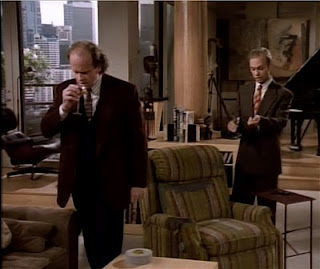
Niles: I asked a simple question.
Frasier: Do you ask any other kind?
And so we hit the first season finale, the 1/11th marker on our quest, and a good place to set up camp. I’ll be giving this feature a rest for the next couple of weeks or so; I’ve got other projects to do, and the last thing I want is to become burned out on one of my favorite shows of all time. Won’t be too long.
From the start, the creators of the show were aiming for a play-like quality, and “My Coffee With Niles” is essentially a one-act with commercial breaks added. Niles and Frasier’s afternoon conversation provides an opportunity to recap the new life that the latter has settled into, and all the problems it entails. Frasier has clearly settled into his routine of radio therapy, afternoon coffees, and fighting with his father, but there’s being settled in and there’s being happy, and, well, there’s the rub.
Niles asks Frasier the fateful question, “Are you happy?”, and Frasier doesn’t know. He’s not especially unhappy, but he’s not especially ecstatic either, and through the afternoon he finds all sorts of ways to dodge the actual question. They have trouble getting a table, Roz visits and has man trouble as per usual, Martin and Daphne show up, Martin and Frasier have another fight, and the poor server (Luck Hari, in a memorable turn) just can’t seem to get Frasier’s order right.
There’s a pleasant and relaxed tone to the episode; you get the sense that the people making the show are comfortable with their creation, and are taking an opportunity to examine the state of play. Each scene seems to establish fundamental relationships; Frasier and Niles see each other often, Niles and Maris have a comfortable if less-than-passionate marriage, Roz doesn’t like Niles, Frasier likes Roz as a friend but would be uncomfortable taking it further, he’s worried about his own relationship prospects and growing old alone, Niles is still stunned by Daphne but doesn’t want to leave his wife, etc. We know most of this already, but there’s a certain satisfaction in seeing it played out in exchanges and vignettes, as though we’re spending a typical, albeit unusually illustrative, afternoon with the characters.
This is really the appeal of the traditional sitcom; the promise that you can visit a fun group of people every week, and enter into a familiar environment where not a lot changes, and what does change tends to do so very gradually. It’s almost as though the episode is reassuring viewers that Frasier, Niles, and the gang aren’t going anywhere.
For all its apparent uneventfulness, “My Coffee With Niles” does have two major conflicts. One is the unending battle between father and son, and this time Frasier and Martin aren’t even arguing about one specific thing (though toast sweat is a major issue). But the bitter edge of the conflict we saw in “The Good Son” is gone; the two seem to have accepted that they’re just going to get on each other’s nerves now and again, and ride it out as best they can.
The second conflict is the oft-deferred answer to Niles’ question of whether Frasier is happy. The irony is, he has no time to ponder whether or not he’s happy with his life, because his life keeps interrupting. As we see in the episode, Frasier’s life has plenty of pros and cons. He’s got a good job and a nice co-worker, but she’s always got relationship troubles. He gets to be with his brother, but his brother’s crush on his dad’s health care worker is driving him batty. He’s away from his son, and with his father, for better and worse. Seattle’s lovely, but there’s the damn rain. The trouble he has with his coffee order is emblematic of the minor dissatisfactions he encounters, but in the end, he can’t really let all of them get him down.
Frasier is forced to conclude that he is happy, and for the summer between seasons all is relatively well. (Indeed, had the show been a failure and this been the last episode, it would have been a nice coda.) So we have a low key, but quite funny finale which examines how complicated the question of our happiness or lack thereof can be sometimes. Most moments of the day, we’re just doing all right. But Frasier’s introspection proves good for the soul, and on that note, we’ll leave him on his own for a bit. We’ve got plenty to talk about in the meantime.
No Guest Caller
Written by David Angell and Peter Casey
Directed by James Burrows
Aired May 19, 1994
Roz: I don’t have anything against religious people. I don’t care if they’re Jewish, or a Jehova’s Witness, or a Buddhist, I am ecumenical, I embrace men of all faiths!
Frasier: If only it stopped there.






